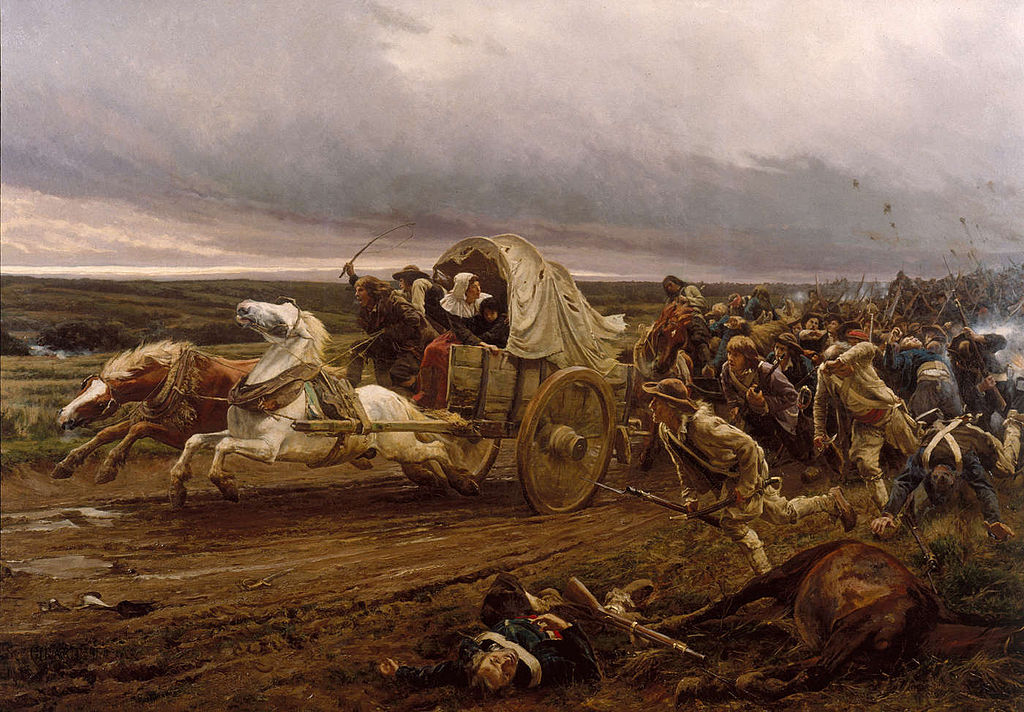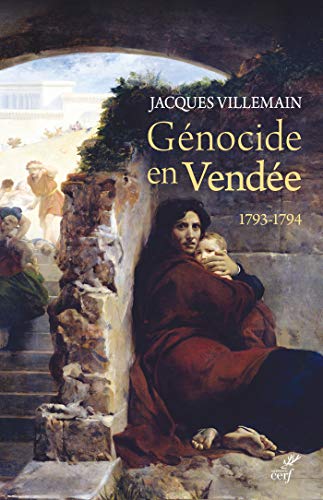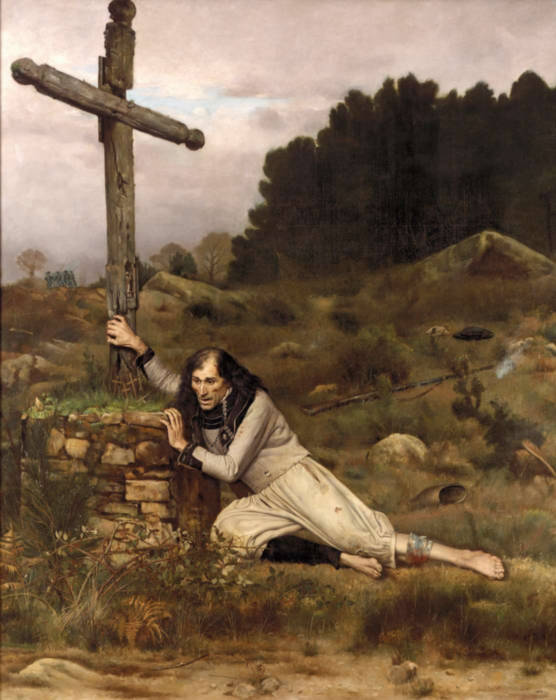This month we are so very honored to present this interview with Monsieur Jacques Villemain, the highly regarded French jurist and diplomat. His recent and magisterial work on the war in the Vendée is the subject of this interview, which is conducted by Christophe Geffroy of La Nef.
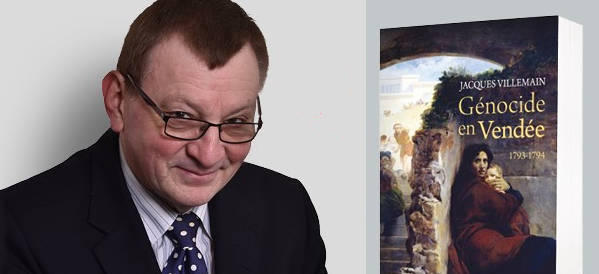
Christophe Geffroy (CG): In 2017, you published a book entitled, Vendée 1793-1794. Crimes de guerre? Crimes contre l’humanité ? Génocide ? Une étude juridique (The Vendée 1793-1794. War Crime? Crimes Against Humanity? Genocide? A Legal Study), in which you seek to demonstrate that these three types of crimes were indeed committed in the Vendée by the troops of the Convention. Why write a new book on this subject today? What is particularly important about this question?
Jacques Villemain (JV): After establishing the legal qualification of the crime, it must be explained. How could a French revolution that began in 1789 on the pretext of proclaiming the rights of man and of the citizen, in just four years managed to commit, and in the very name of these ideals, these mass crimes? This is the first part.
But the main part of the book is devoted to the reasons which prevent us in France to look this past in the face – when Reynald Secher published his thesis on “the Franco-French genocide” in 1986, it created a beautiful scandal! This is because the University, at least the university sector dedicated to the history of the French Revolution, has been from the beginning (1891) organized solely for the celebration of the Revolution. Originally it was about producing a doxa legitimizing the republican regime, which was at that still contested in France.
The revolution was a “bloc” to use Clemenceau’s famous phrase, there was no question of admitting that there could be abuses and crimes. The Vendeans were criminals, traitors, debris of a bygone past, and the Terror was absolved in the name of “circumstances.” We are not there anymore. The very half-hearted celebration of the Bicentenary in 1989 clearly showed that there had been several phases in the Revolution, and that we could hardly celebrate the period 1789-1792 (and especially not all of 1792), that is, in effect, the “liberal” period, that of the affirmation of human rights. These rights were the great victim of the period that followed, and in the massacres of September (1792) to at least until 9 Thermidor (1794). The Vendée genocide falls within this interval.
Now that the Republic is no longer contested in France, we can make distinctions and exercise our right to inventory the revolutionary period, which includes the “good,” the “less good,” and the “totally criminal.” This the radical Left does not admit, and it is entrenched in the University, that high place which Marcel Gauchet termed as “cultural leftism,” and which is a bunker all the more comfortable since it has no hold on reality (apart from training history and geography teachers – disaster subject matters in a National Education which is itself not in great shape).
University historians, who specialize in the revolutionary period, and who are mostly radical left activists, can thus say just about anything, none of it having the slightest practical importance. A number of their outright Communist works (say from 1920-1989) cannot be read without a smile today, and their current fallacies are no less ridiculous.
I try to continue what Reynald Secher showed earlier, but by as a legal demonstration, to show that one can acknowledge this genocide without calling for “repentance,” without “pulling down the statues,” and without hatred and contempt for our national history.
CG: You insist on the legal character of the concept of genocide, thereby distinguishing yourself from a historical or social analysis. How important is the legal character of the concept of genocide in such an investigation?
JV: First of all, the notion of genocide is an exclusively legal concept. It was conceived for the sole purpose of the penal repression of a crime which, until the Shoah, had no name, but whose concept was recognized by international custom – this “human right” was expressly invoked as a basis by the UN Convention of 1948 which defines it.
Historians and social scientists, committed to denying the genocide thesis, ignore it cleverly if not willfully. Some forge their own concept of genocide in order to then be able to demonstrate that it excludes the Vendée case – their demonstration is in their basic assumptions. We even see aberrations by historians claiming that “extermination” in the eighteenth century does not mean “killing everyone” as today, which is of course denied as much by the dictionary of the French Academy (1762 edition) as by the use made of the word, for example in Racine or La Fontaine – so already a century before the facts.
I devote an entire chapter to dismantling the fallacies of historians denying the Vendée genocide, more than one of which oscillates in practice between obvious bad faith and being completely ridiculous. Thus, for example, François Furet, could only have a career outside the University which, in the field of studies pertaining to the revolutionary period, we can point out, is completely “hogged” by the Robespierrists. The “Social Sciences,” as you say, have become a combat sport of the radical left where they engage in powerful relay races.
Today, for example, it is Jean-Luc Mélenchon, who calls himself Robespierriste, and it is the LFI (the left wing political party La France insoumise, Unbowed France) which is trying to have a “Rue Robespierre” created in Paris (for the moment there is only one metro station called, “Robespierre” in the commune of Montreuil, historically communist, which gave it this name in the euphoria of the Popular Front in 1936).
Robespierre remains a symbol of social revolution and of the legitimization of violence in politics – to say that he was involved in the commission of genocide is obviously blasphemy for a whole politico-university fringe which supports the “Right to blaspheme” but only on the condition rthat said right spares his convictions.
CG: So, there is a precise and universally recognized definition of genocide, to clarify the debate?
JV: Yes. It is stated in the UN Convention “On the Prevention and Punishment of the Crime of Genocide” (1948), as interpreted in the 1990s by the case law of the courts established by the same UN to judge genocides in ex -Yugoslavia (Srebrenica), in Rwanda; then with its assistance in Cambodia (genocides of the Khmer Rouge); and finally by the International Criminal Court.
This is the basis of my analysis. Because if the notion of “genocide” is from the 20th century, the reality of the fact (systematically massacring a whole “stable and permanent human group” by targeting it “as such”) was well recognized as criminal in the 18th century. Such a thing was condemned without having the word “genocide” to designate it. But it was precisely at this time that its equivalents appeared, used by committed revolutionaries, and in no way favorable to the Vendéens. It was Joseph Lequinio who, 1794, spoke of “depopulation” (because the word “depopulation” could evoke an involuntary phenomenon). And, in 1797, Gracchus Babeuf, who is often taken for one of the first Communists, forged the adjective “populicide” which has exactly the same etymology as “genocide.”
What the evolution of law and especially of the jurisprudence of the twentieth century brings us is the way of analyzing criminal intent in the context of mass crimes. In these cases, we cannot reason as in the matter of individual criminality, because in mass crimes it is not an individual who kills another, but a collective of criminals who attack a collective of victims – the first do not know the latter and vice versa. Hitler or Himmler certainly could not have been individually linked to any of the 6 million Jews they killed, and yet they are very well responsible for these crimes.
How to establish mass crime? This is the subject that the Nuremberg Tribunal focused on, followed by the international criminal tribunals created by the UN to try mass crimes (crimes against humanity and genocide) committed in the former Yugoslavia and in Rwanda, then the courts set up in Cambodia with the support of the UN to try the crimes of the Khmer Rouge.
It is this experience, I was going to say this criminological know-how which, as such, is not attached to a particular period, that I use to reason about the atrocities committed in the Vendée – and which I demonstrate were indeed genocide.
CG: What is the difference between genocide and crimes against humanity?
JV: It was especially during the Nuremberg Trials that we became aware of the difference. Admittedly the Nazis had exterminated en masse Russians, Poles and Ukrainians, but that was to free up a “living space” for the future Reich and one would then have preserved these populations to reduce them to bondage for the Reich’s profit. There was no general extermination plan or principle against these people, even though there were undeniable mass killings. On the contrary, the Jews were targeted in general and absolute terms and “as such,” their very existence being intolerable; and in principle not a single one should have survived, if the Nazis had achieved their ends.
The difference between the two exterminations was a difference in nature and not just in degree. This is why no sooner had the Nuremberg Tribunal closed its doors than the UN launched the work of drafting what would become the 1948 convention which made “genocide” a crime distinct from other “crimes against” humanity, because it is not the same criminal intent.
A crime against humanity involves the general context of a widespread or systematic attack against a civilian population, but not necessarily with the aim of exterminating it entirely “as such.” For example, there is no doubt today that the reduction to slavery of human groups constitutes a crime against humanity; but by hypothesis, when we want to reduce people to slavery, we do not want to kill them since then we could no longer make them work – qualifying the slave trade as genocide on the grounds that it caused a very large number of deaths is not supported.
The generalized massacre of American Indians is not a genocide either – besides the fact that the causes are much more involuntary (spread of European diseases such as smallpox to which these populations had no immunity) than premeditated, the goal was not to exterminate them but to steal most of their land (and for the rest they would be confined to “reserves”). We are quite clearly within “crime against humanity” but not within “genocide.”
On the contrary, when it comes to the Jews, the Nazis wanted them to disappear from the face of the earth as some kind of pollution of the human species.
The Convention also thought that the very existence of the Vendeans was incompatible with that of the France they wanted to build; and we find, for example, revolutionary authorities who speak of the “crime of their existence” – the crime of the Vendeans was to exist. The consequence is extermination, as complete as possible – genocide.
CG: The texts of the Convention, of the Representatives on mission, of the Committee of Public Safety as well as of the generals that you quote are often chilling with cynicism in their will to exterminate. How do you explain that the will for such a crime was possible and shared by so many?
JV: I think one could say, cynicism and/or blindness. The Vendée uprising asked revolutionaries this unbearable question: how can a notable part of the people rise up against them? They claimed that they were acting in the name of the people and for their happiness! Yet August 10, 1792 was only the coup d’état of a small minority and the Convention was elected in a climate of terror (90% abstentions). The Vendée uprising sent this government back to its imposture, which it neither wanted nor could recognize or understand.
Bertrand Barère, of the Committee of Public Safety, spoke of “the inexplicable Vendée” before the Convention. The revolutionary still had an explanation in which he either believed (blindly), or which he held on to because it was convenient (cynicism) – that the Vendeans had been brutalized, degenerated by centuries of clerical and nobiliary domination. “It is out of the principle of humanity that I purge the earth of these monsters,” Jean-Baptiste Carrier said in Nantes. Here by “humanity” is meant “progress” and “monsters” literally designates “abnormal.” There is no other choice but to eradicate this sub-humanity for the happiness of true Humanity, that of the future.
The Convention members spoke of the Vendeans as the Nazis came to speak of the Jews – “the accursed race,” “the execrable race,” “to be exterminated to the last,” etc. are all recurring terms in their rhetoric. The genocidal logic is also, and perhaps first, there. This will is then relayed by a flawless “chain of command:” this concept and that of a “joint criminal enterprise,” which is the culmination of the experience of the Nuremberg Tribunal on “Criminal Organizations” (like the SS, for example), are essential to the demonstration that there was indeed genocide.
It should be understood that the genocidal will did not form overnight. François Furet spoke about the policy of the Convention in the Vendée of an “election of hatred” – it is a gradual process. At the beginning (March 1793) the Parisian revolutionaries believed in a simple jacquerie: they had the required troops and decided to put all the insurgents to death, even if they had not taken arms.
It was an avalanche of war crimes. And yet the revolt not only was not put down, but it extended to the point of siege before Nantes. From then on, the Convention grew fearful and with two laws, of August 1 and October 1, ordered a policy of scorched earth in the Vendée (it is “Destroy the Vendée” repeated six times in the speech by Barère to get the vote for the first of these laws), which characterized a “generalized or systematic attack against a civilian population,” and therefore a policy of crimes against humanity.
And yet the Vendée continued to fight. When it was finally defeated in December 1793 at Savenay, and henceforth there was no more Vendée military force, except perhaps François de Charette who moreover only had a few hundred men in the region of de Retz – one might have expected the Convention members to seek pacification.
But this is precisely the moment when they decided to unleash the “infernal columns” on the Vendée, whose mission was to comb the country by burning everything and killing all those they met, including, where applicable, the Republican Vendéens (because there were still a few in the “Catholic and Royal” country). The Vendée must become a “national cemetery” (said General Turreau), a kind of blank page on which we can finally build the new society. As is obvious, genocidal logic crowns the spiral of violence, a criminal intent that had been built up gradually, but also that had hardened until it could be implemented.
CG: Why do you qualify the Vendée war as a “religious one?”
JV: In 1789, the “Vendéans,” had rather welcomed the Revolution. But both their religious culture and their social life were structured around Catholicism. Living in small parishes, isolated in their bocage around their “good priests,” who came from their own ranks and so were close to the people. These priests now saw their world crumble when they began to be hunted down for refusing the Civil Constitution of the Clergy in order to remain faithful to Rome.
When, in addition, the priests were required to go and fight at the borders to defend this new order that fell upon them (in March 1793), there was an explosion. Opposing them was the “Republic,” which took on the value of a true “political religion” or “secular religion” – Jules Michelet did not invent anything when he spoke of the Revolution as a new “Church” and a new “Gospel.” Mona Ozouf describes the search by the revolutionaries for a “transfer of sacredness” to found the new regime on a new legitimacy, like that of the king which was based on the coronation at Reims. But this required a “transfer of faith.”
The core of this war was religious – but religious on both sides. What really put an end to the war in the Vendée was the Concordat of 1801 (agreement reached between Bonaparte and the papal representative during the Consulate). Because the war continued at low intensity after Thermidor and the first attempts at pacification in 1795 (treaties of La Jaunaye, La Mabilais and Saint-Florent) – these agreements were never respected on either side, because Parisian authorities could not agree to restore the freedom of worship, which was the real reason for the Vendée uprising.
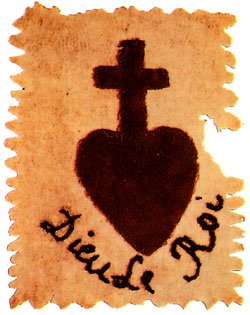
In 1797, there was even an upsurge in the policy of de-Christianization (it was under the Directory that most religious buildings would be destroyed, for example, such as the famous Cluny abbey). This is made clear in the report made to the Council of State by Joseph-Jérôme Simeon for the ratification of the text negotiated between Bonaparte and Pius VII – it is religious persecution which is at the origin of the revolt; and if freedom of public worship had been restored to the Vendéens earlier, we would have had peace sooner, or even no war at all.
After all, even the execution of the king in January 1793 had not caused an uprising. And after the Concordat there would be no more Vendée uprising. The Duchess of Berry in 1832 did not succeed in stirring up the region against Louis-Philippe. As in 1815, only a few nobles, for whom the monarchist cause counted as much or more than the Catholic cause, rose up. But the peasants did not follow – they had obtained the return of their “good priests,” and that was enough for them.
One question remains: why was there only one Vendée? In fact, there were many uprisings against the revolutionary Parisian dictatorship, since there were up to 60 departments in insurrection out of the 83 in France at the time. Either Vendée Catholicism was particularly internalized and “militant,” or it was particularly structured for the population which lived in what became the “Military Vendée,” or its initial successes allowed the uprising to become wide-spread and durable (and all these causes can be cumulative). But it is a fact that only the Vendée uprising was qualified, and this from the beginning, as a “war” by the Parisian revolutionaries themselves.
CG: What are the main obstacles to the recognition of the Vendéan genocide?
JV: It is the revolutionary faith that is in question, this idea that violence “brings about history” (Marx) and is the necessary and thus legitimate means of political and social progress. The revolutionary studies at the French University were organized under the Third Republic, first to celebrate the Revolution as the founding myth of the Republic. We then convinced ourselves that 1917 would be the new 1793, or the continuation of the movement of social revolution previously launched by the sans-culottes, but without Thermidor this time.
The marching wing of the Left, now Communist, then took over the management of this university sector – since 1937 all the holders of the chair of the history of the French Revolution at the Sorbonne, which sets the tone on this subject, have been members of the Société des Etudes Robespierristes, and almost always inset Communists or “fellow-travelers.” They have powerful political links. Today it is Jean-Luc Mélenchon especially, who calls himself Robespierriste, but even in yesteryears a François Mitterrand or a Lionel Jospin did not want to nurture an image of “the Left” that the economic policy they were pursuing was chipping away at was enough to dissociate themselves from it. This is still very true today.
Even if no historian can continue to claim like Clemenceau in the last century that “The Revolution is a bloc,” it nevertheless remains the doxa of the radical Left for whom the faith and especially the revolutionary hope remains intact, and which cannot therefore endure the questioning of this revolutionary tale which François Furet qualified as “vulgate Lenino-populist” and which takes the place of Holy History. It is a very small minority, but it is focused and activist, and propped up on strong institutional positions.
Today, the Republic is no longer a contested regime in France; we can afford to take stock of the good, the bad and the unacceptable in the legacy of the period of 1789-1799. Moreover, what we call the “Republic” today has nothing to do, institutionally or otherwise, with the terrorist regime of 1792-1794. It is interesting to note that President Macron celebrated the Republic in the Pantheon, taking as a reference the Republic’s proclamation on September 4, 1870. It is indeed the birth of the parliamentary and democratic republic which is the one in which we live today.
It is no less interesting to note that it was a Jean-Luc Mélenchon who responded to Macron by saying that the real date to remember is September 21, 1792, that is to say, precisely the foundation of the terrorist republic which would bloody France until Thermidor and make the very name of “Republic” odious in France until 1870.
During most of the 19th century France tried to find a form of constitutional monarchy. We tried with the Bourbons in 1815, with the Orléans in 1830, with the Bonapartes in 1852, and even a return to the Bourbons/Orléans in 1871-75, which would fail because of the irreconcilable divisions among the different monarchist groups. The different families who reigned over France having shown themselves incapable or having refused to make room for the representative regime, the Republic is in a way “by default;” and finally what is today its most stable form is another form of “republican monarchy.”
We no longer need the revolutionary myth to found the Republic. On the contrary, this idea that it is from violence that political and social progress comes appears to us today for what it is – a dangerous chimera. Disorder is not the climate in which justice progresses. On the contrary, it is the climate in which all injustices and all crimes become possible, if not inevitable.
CG: Why does official recognition of this genocide seem important to you today? What would be the point?
JV: It is a past that does not pass away. The Vendée has not forgotten. Otherwise, Philippe de Villiers would not have been able to found his “Puy-du-Fou” with so many volunteers, and continue it until today on the same basis, that is to say for more than 40 years.
We must also consider that the Vendée genocide is the high point of a trauma that has permanently rotted relations between the Church and the Republic. They were not necessarily meant to be confused with hostility, however. The republican form of the regime did not, even at the time, pose any problem to the Church, where it was not accompanied by antichristianism (the case of the United States); and it was even clearly preferred by the Church in some cases (Ireland, Poland).
Because of this initial trauma that even today we have not really succeeded in appeasing by a process of truth, we have invented a concept of “secularism,” anti-religious in fact, if not in principle, and which only exists in us to the point that this term is untranslatable in other languages. Recognizing the origin of the problem is essential, if we want to overcome it. The recognition of the Vendée genocide, which is in no way attributable to “the Republic,” but to a terrorist group which seized power under this name in 1793-94, just as another terrorist group will seize power in Russia in 1917 to remain there by violence for 70 years – only this recognition can allow us to strengthen our national unity and consider more serenely the moral and intellectual future, even spiritual, of our country.
The more violent a revolution, the more it delays the advent of a peaceful and democratic society. In England, the revolution of 1649 was followed by ten years of civil war at the end of which a successful Restoration allowed the country to regain its base, even with the crisis of 1688.
In France, where the Restorations (Bourbons, Orléans, Bonaparte) did not succeed in taking root, it took almost a century to begin to digest the period of 1789-1799 – we did not begin to enter into truly democratic mores until around 1880; and political liberalism took even longer to come about.
In Russia, the violence of the Revolution in 1917 was such that even more than 30 years after the collapse of Sovietism, it is clear that liberal democracy is not yet relevant there even if a whole segments of Russian society aspire to it. You do not make flowers grow by pulling on them or, as Talleyrand already said, “Time does not respect anything that we try to do without.”
The Revolution is not a means of progress – sometimes necessary, or rather inevitable, to bring down an unjust system, or one that has become incapable of ensuring the common good, it can destroy – but it does not build anything. It is time that we realized, that we admit in France, that the democracy in which we live owes nothing, except perhaps symbolically and nothing more, to 1789-1799, which was overall a formidable regression of civilization, right up to genocide.
The liberal ideas of 1789 would have finally prevailed anyway, in the great movement of political reform which manifested itself everywhere in Europe from the 17th century onwards. These ideas could certainly have won out much more gradually, as was done in the United Kingdom, which descends gently from the “limited monarchy” of 1689 to the aristocratic regime of the 18th century and its progressive democratization in the mid-19th century. And that would have been preferable: England has undergone a much more reasonable development, and democratic mores have taken root much more deeply there than in France, where even still in 1940 the Republic aroused enough hatred and opposition as historical trauma that it was overthrown in favor of a regime which renounced even its name.
It is therefore not the Republic that is at issue here, but the myth of political violence as a means of progress that must be deconstructed. Realizing that the Human Rights Revolution was able to degenerate into genocide should undoubtedly make us collectively more reasonable about what we can expect from violence in politics and about the tragedy of an ideological regime that claims to bring about a “new world” and a “new man.”
I see no better conclusion on this subject than to quote the speech Solzhenitsyn made on September 25, 1993 at the Historial of Vendée, built on the initiative of the Vendée departmental council, then chaired by Philippe de Villiers:
“It was the 20th century that considerably tarnished, in the eyes of mankind, the romantic halo that surrounded the revolution in the 18th century. Men have at last come to know, based on their own misfortunes, that revolutions destroy the organic character of society; that they ruin the natural course of life; that they annihilate the best elements of the population, giving free rein to the worst; that no revolution can enrich a country, just a few unscrupulous hustlers; that in its own country, generally, it is the cause of countless deaths, widespread impoverishment and, in the most serious, lasting degradation of the population.”
The French version of this interview appeared in La Nef.
The image shows “La déroute de Cholet, octobre 1793” (“The Rout at Cholet, October 1793”) by ules Girardet, painted in 1886.
Translated from by French by N. Dass.
